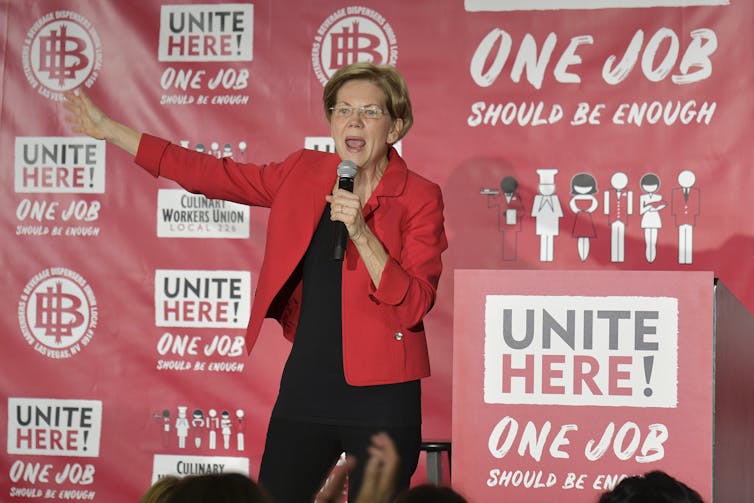150 cooks, servers and dishwashers almost shut down a Democratic debate, showing unions' growing clout in the party
- Written by Ruben J. Garcia, Professor of Law, Co-Director of UNLV Workplace Law Program, University of Nevada, Las Vegas
Organized labor’s clout in the Democratic Party is growing. For evidence, look no further than the small California food services union that nearly managed to shut down[1] a presidential debate.
Unite Here Local 11, which represents 150 cooks, dishwashers, cashiers and servers, had planned to picket the Dec. 19 debate at Loyola Marymount University in Los Angeles, where they work for Sodexo, a food contractor. The dispute involved their struggle to negotiate a collective bargaining agreement on better terms.
All seven candidates invited to participate, starting with Sen. Elizabeth Warren[2], said they would refuse to cross a picket line to take the stage.
After the candidates pulled out and Democratic National Committee Chairman and former U.S. Labor Secretary Tom Perez got involved, the national spotlight helped the groups quickly secure a deal that allowed the event to take place. The tentative agreement included a three-year contract[3], a 25% increase in compensation and a 50% drop in health care costs for the workers, many of whom make at or slightly above the minimum wage.
That the labor movement is a key constituency for the Democratic Party is hardly new. But I believe, in part based on my research[4] on unions in Nevada, there are some differences that may make labor even more important as we head into 2020.
 Sen. Elizabeth Warren was the first to vow to skip the debate unless the strike was resolved.
MediaPunch/IPX/Damairs Carter
Sen. Elizabeth Warren was the first to vow to skip the debate unless the strike was resolved.
MediaPunch/IPX/Damairs Carter
The first difference is the electoral map.
Today, many of the places where labor is strongest are key swing states[5] like Michigan, Wisconsin, Pennsylvania and Nevada, with union membership near or above 10%. In states like these where the margin of victory is expected to be very tight, union members will be critical for the Democratic nominee.
Going into the 2016 election, these states were expected[6] to be safely “blue” in favor of Hillary Clinton. But President Donald Trump’s victories in places like Michigan and Pennsylvania show that none of them can be taken for granted, putting more attention on gaining workers’ support.
Second, with the decline in manufacturing in the Upper Midwest, service unions have become especially important. This matters because service unions, which interact with the public much more than manufacturing workers, can bring more publicity[7] and political clout[8] to their labor disputes in schools, hotels and the streets of heavily populated urban centers.
One of the most powerful examples is the Culinary Workers Union in Las Vegas, which is affiliated with Unite Here. The union recently hosted[9] three top Democratic candidates – Joe Biden, Bernie Sanders and Elizabeth Warren – to address its members as it mulls which one to back ahead of the Nevada caucuses in February 2020.
The union[10] is seen[11] by many as responsible for flipping Nevada’s state legislature and the governor’s mansion from red to blue[12] in recent elections. And its get-out-the-vote operation helped the Democratic candidate in the last three presidential elections pick up the state. This strength of labor in what is a right-to-work state[13] – which allows workers to not pay any dues to the union that represents them – is what I have dubbed[14] the “Nevada paradox.”
The fact that Unite Here used the Democratic debate to help its cause is no accident. Its president, Donald “D” Taylor, has been vocal[15] about the need for the Democratic Party to not take labor’s support for granted.
On issues like health care, immigration and efforts to organize at nonunion casinos on the Vegas strip, Taylor has demanded that candidates back up their words with action, including walking the picket line if necessary.
As such, his union has been a model of political engagement for the rest of the labor movement. And it shows that the candidates should expect organized workers to have a larger voice than usual as they vie to be the nominee to take on Trump.
[ Expertise in your inbox. Sign up for The Conversation’s newsletter and get a digest of academic takes on today’s news, every day.[16] ]
References
- ^ managed to shut down (www.latimes.com)
- ^ starting with Sen. Elizabeth Warren (www.nationalreview.com)
- ^ included a three-year contract (www.vox.com)
- ^ my research (scholar.google.com)
- ^ are key swing states (theconversation.com)
- ^ these states were expected (www.usatoday.com)
- ^ can bring more publicity (www.researchgate.net)
- ^ political clout (www.nationalaffairs.com)
- ^ recently hosted (www.nytimes.com)
- ^ union (www.wsj.com)
- ^ seen (www.motherjones.com)
- ^ flipping Nevada’s state legislature and the governor’s mansion from red to blue (www.npr.org)
- ^ right-to-work state (theconversation.com)
- ^ I have dubbed (scholars.law.unlv.edu)
- ^ has been vocal (www.dailykos.com)
- ^ Expertise in your inbox. Sign up for The Conversation’s newsletter and get a digest of academic takes on today’s news, every day. (theconversation.com)
Authors: Ruben J. Garcia, Professor of Law, Co-Director of UNLV Workplace Law Program, University of Nevada, Las Vegas

